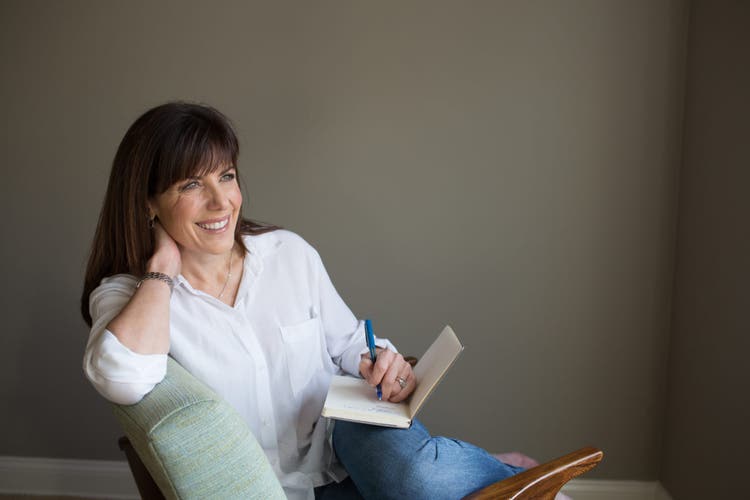Financial Expert Jean Chatzky Offers Advice on Creating the Financial Life You Deserve

Jean Chatzky knows there’s an important connection between financial health and personal health. As the best-selling author of eight books and financial editor for NBC’s “Today” show, Chatzky says the same principles that work toward achieving a better body also can be applied to building financial security and a healthy investment portfolio.
“Knowing how to manage money is one of the most important life skills for people at every age,” says Chatzky, a personal finance expert, who also hosts the podcast “HerMoney” on iTunes.
Her newest book, “Women With Money: The Judgment-Free Guide to Creating the Joyful, Less Stressed, Purposeful (and Yes, Rich) Life You Deserve” (Grand Central Publishing, March 2019), shows women how to take charge of their finances. Chatzky also offers a HerMoney Facebook group where women are encouraged to ask money questions in a judgment-free zone.
Although her latest book was written with women in mind, Chatzky says many of the core principles can be used by anyone who wants to achieve financial wellness.
Become a Smart Investor
According to Chatzky, investing is the best way for most people to build wealth, yet she admits the prospect of how and where to invest can be daunting.
“Investing in the stock market isn’t for short-term goals like tuition or a down payment on a house. It’s a strategy to help fund your long-term goals,” Chatzky says. “Studies show fewer women buy stocks than men, but women who do invest tend to outperform their male counterparts. Part of this is because women take on less financial risk and engage in less trading than men.”
In addition, Chatzky notes women tend to prefer to keep their savings in cash or banking accounts, which does almost nothing to help them increase their overall wealth.
“Some people think they need to be a financial expert or make over six figures a year to invest, but the reality is, if you have a 401(k), you’re already investing,” Chatzky says. “It’s important to invest your money so it lasts as long as you do.”
Chatzky says one of the easiest ways to invest is through an employer-sponsored 401(k) or, if you don’t have one, by setting up your own personal Roth IRA or traditional individual retirement account.
“If your employer has a matching 401(k) retirement plan, you should take advantage of it by contributing enough that you get the full match,” Chatzky says. “In addition, if you’re self-employed or want another source of retirement income, you can open your Roth IRA account and contribute up to the full $5,500 a year to get tax-free cash in retirement.”
Have a Personal Financial Plan
Just like you have a plan for your health that includes an exercise regimen, eating balanced meals and practicing stress management, Chatzky says it’s also important to have a personal financial plan that serves as a road map for your future.
“Having a financial plan helps you set investment goals and understand your priorities,” Chatzky says.
Chatzky says good financial planning can help you prepare for everything from an economic recession to an unexpected family emergency.
“Some people are reluctant to seek out a financial planner because they think it will be expensive, but it doesn’t have to be,” Chatzky says. “If you have a retirement plan through your employer, they might offer consulting services.”
If you’d like to try tackling investing on your own, Chatzky says there are computerized “robo-advisers” that can help with financial planning and investing by leading consumers through a series of questions online. Ellevest offers a robo-adviser specifically tailored to women with no minimum investment required. Betterment and Vanguard also have digital plans.
Smarter Ways to Save
No matter what age you are, Chatzky says it’s always possible to save more.
For young people who are just starting out in their careers and who may be struggling with student loan debt, Chatzky recommends socking away as much money as possible each month, even on a tight budget. Need help? There’s a wide array of smartphone-friendly savings apps that can help. Among them are Chime, Qapital, Acorns and Digit, one of Chatzy’s favorites.
“The Digit app is a great resource that can help you find extra money in your budget and automatically save that money,” Chatzky says.
Digit uses an algorithm to calculate how much you can put aside and then places the money into a digital savings account, automatically adjusting based on your income and spending habits.
For those who are older and worried they may not have enough money put away for retirement, Chatzky suggests looking at ways you might be able to save money or earn more.
“You can always make your life better by making changes such as downsizing your home or relocating to an area with a lower cost of living,” Chatzky says. “I encourage people to live modestly and spend less money than they make. By doing this, they can get out of debt and achieve financial freedom.”
Photo credit: Sandra Wong Geroux